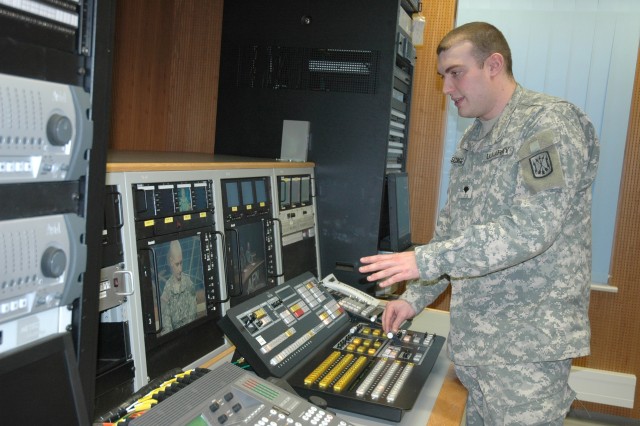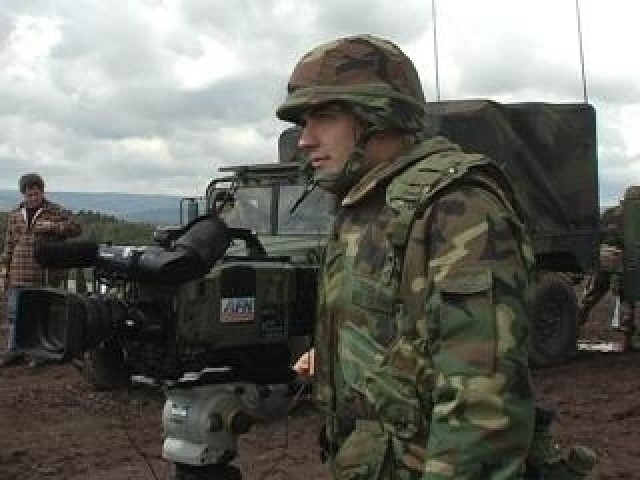WIESBADEN, Germany (Army News Service, Feb. 1, 2007) - They say you never know what you'll do in a life-threatening situation until it occurs, but for one Wiesbaden Soldier "doing the right thing" came as naturally as drawing breath.
Spc. Anthony Scroggins, a broadcaster/producer with the American Forces Network-Hessen known to listeners by his radio moniker, "The Scrogg," came to the aid of a stabbing victim by disarming the man's attacker and neutralizing him until German police arrived.
Scroggins was recognized for his valor and lifesaving actions by Mainz Police President Franz Kirchberger in a ceremony at the Mainz Police Headquarters Feb. 1.
The AFN broadcaster said the incident occurred the evening of Jan. 6 while he was waiting for his girlfriend to undergo an X-ray at Mainz's Johannes Gutenberg University Hospital. Hearing a commotion in the hallway, Scroggins said he went to investigate.
"I saw a guy bent over stabbing another guy in a chair," he said, explaining that several hospital staff members who were not far away seemed to be arguing and were not interceding. "As soon as I rounded the corner I saw the knife coming out of the victim and I came up under the assailant's arms and pulled them up into the air."
While pinning the man and holding his arms tightly in the air, Scroggins said, the attacker managed to somehow pass the knife to an accomplice who must have left the hospital with the weapon.
"While I was holding him I was looking around and noticed the blood all over the floor," he said, adding that he eventually handed the man over to a doctor's custody, only to witness the attacker making a break for the hospital entrance a short time later. "The guy was getting away so I chased after him ... about 20-30 yards. I grabbed him again and brought him back inside."
Scroggins said he set the man down on a chair and kept a close eye on him, along with one of the doctors, until the German police arrived.
Throughout the incident, Scroggins said he "felt like he was on autopilot. I didn't think. It's that surreal. There was no conscious decision on my part.
"When I went back to my girlfriend, Bianca, she was sobbing hysterically," Scroggins said, explaining that while he was involved with the police and the doctors his girlfriend, not knowing what had occurred, but aware of the violent commotion in the hallway, was told Scroggins had been "taken away by the doctors."
"It wasn't until I got back to Bianca that it finally hit me what happened," he said. After reassuring Bianca that he was OK, both of them again talked to the police about what had transpired.
"The nurses told my girlfriend that the victim had been stabbed six times," Scroggins said, adding that the doctors were convinced Scroggins had saved the man's life.
"We're very proud of him," said Lon Blair, AFN-Hessen operations director. "He's universally loved by everyone who works with him and is always willing to help everyone on the team.
"He's very humble," Blair added, saying that he was informed by the German police that the doctors were convinced "if Scroggins hadn't intervened the man would have died.
"In my conversations with the German police they said his actions were exemplary and they wanted to recognize his behavior as an example of one citizen intervening to save another.
"Often there's bad news - stories about Soldiers getting in trouble on the weekends - but I think overall Soldiers are people of strong judgment, and military people are brave," Blair said.
Blair added that while the German police recognized the American Soldier on their own initiative, the AFN Hessen command was putting him in for an award, possibly the Soldier's Medal, and he was also to be honored by the U.S. Army Garrison Hessen for his actions.
"My girlfriend always calls me her hero, and after that happened, she said, 'Now you're really my hero,'" said Scroggins, who was born in Modesto, Calif. "I think a hero is someone who goes out to save someone. I just did what anyone would do."
(Karl Weisel writes for the U.S. Army Garrison Hessen Public Affairs Office.)






Social Sharing